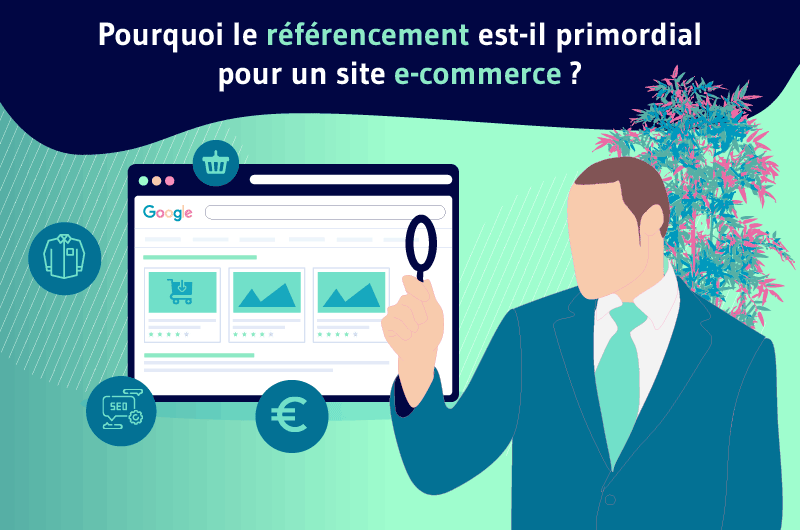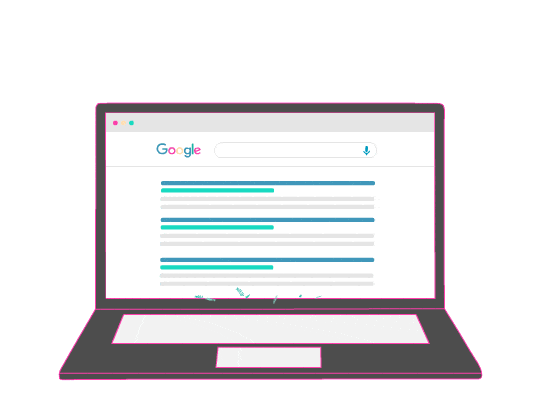Article invited by : Olivier CLÉMENCE of reussir-mon-ecommerce.fr
The natural referencing or SEO (for Search Engine Optimization) is a set of methods that allows to include and position a link in the search results of Google.
It is a lever of traffic acquisition that you can not neglect for your e-commerce.
Indeed, 44% of visits to a site come from Google, which means that if you don’t pay attention to SEO, you could be missing out on almost half of the you could be missing out on almost half of the potential visitors!
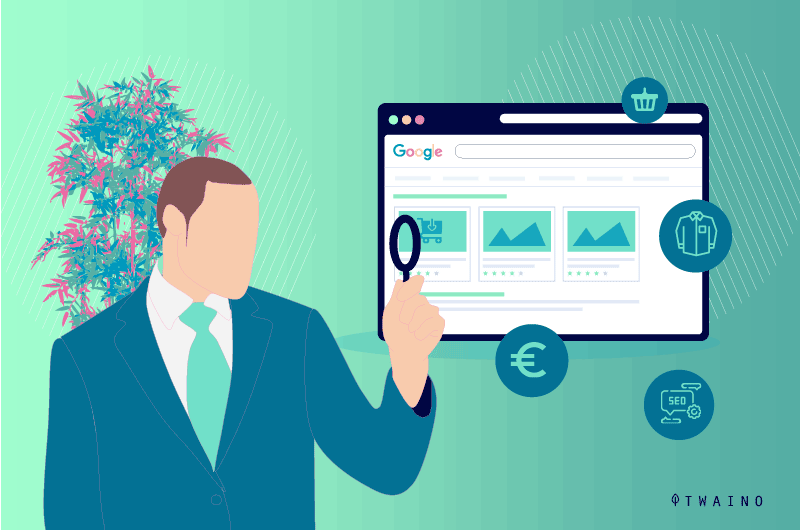
I will explain how this simple and simple and risk-free discipline will help you gain traffic to your online store. And who says traffic, says sales!
Search Engine Optimization is one of the most profitable solutions
Be careful, I’m not telling you that natural referencing is free!
Because even if you do not pay the services of an SEO expert or if you do not follow an sEO trainingtraining, you will still have to invest time in your natural referencing.
And time is money!
However, the results of SEO are exponential.
This means that the initial work will bring an increasing benefit, with no additional investmentor very little.
In fact, with SEO, as the results are exponential, the profitability is increasing as well.
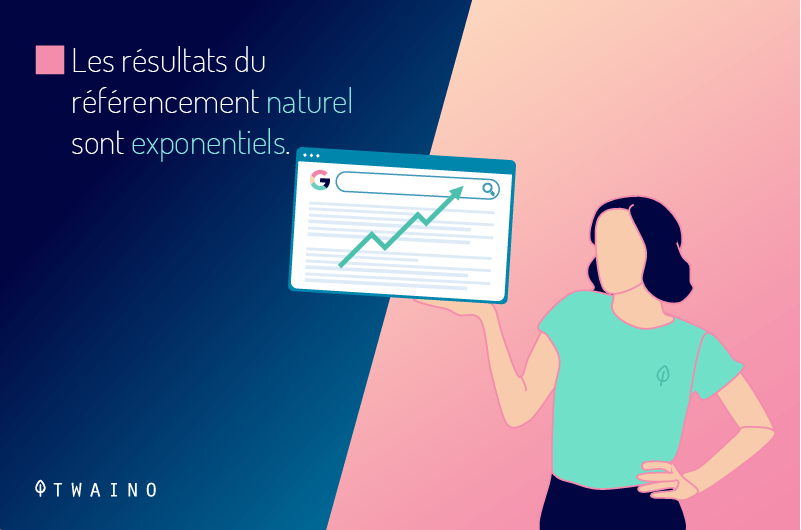
This is exactly the opposite of what happens with online advertising, where the investment and return on investment curves are parallel.
Whereas with SEO, the investment curve is stable or even decreasing, and the return on investment is, as we have seen, exponential.
If I tell you that the investment curve can be decreasing, it is because the maintenance of SEO is less and less less and less time-consuming as time goes by.
Provided, of course, that it has been set up correctly from the beginning.
SEO brings qualified traffic
Qualified traffic is a flow of Internet users whose actions on your site will bring you closer to your goal.
And as an e-merchant, your goal is to sell your products.
A qualified visitor is the one who will add one of your products in his cart and place an order.
From there, let’s go back a bit.
The Internet user calls Google because he has a question, a need, and he wants a solution.
When Google positions sites at the top of its search resultsit means that it considers that these sites give the answer to users’ questions.
So, if they are well referenced, your pages appear when the visitor is most in demand.
And in this case, he is logically much more willing to make a purchase from you, since you provide them with a solution to his problem.
Thus, unlike advertising which is more intrusive and interrupts the user in his activity, with SEO, it is the customer who comes to you and not the opposite.
In the case of advertising, the visitor does not necessarily have a need, you create one by distracting him in his navigation and, most of the time, by offering him an exceptional promotion.
This customer may then arrive on your site by interest for the promotion more than for your products… This is not the ideal way to build a loyal customer base!
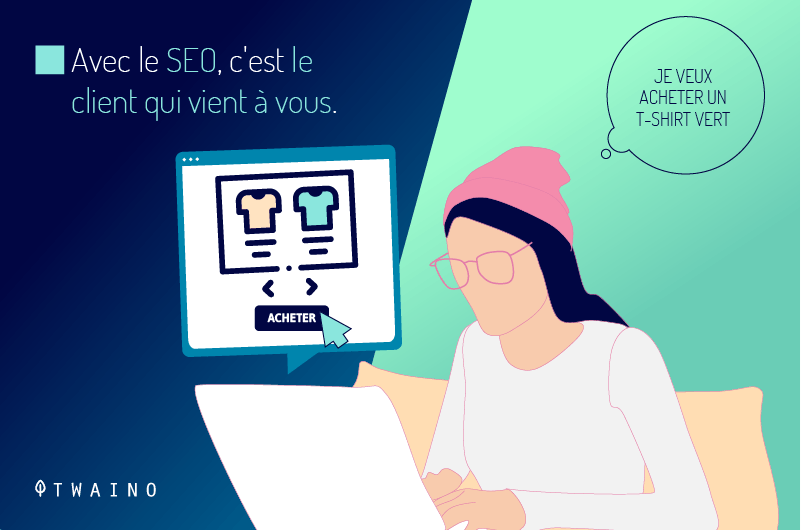
The flow provided by natural referencing is constant and predictable
Except in the case of seasonal activities and current events, the queries recorded by Google are rather constant.
In fact, the number of people who search for, for example, “buy a 500 GB external hard drive” is the same throughout the year.
This means that if your pages are very well positioned on this keyword from the beginning, they will remain so for several months.
Of course, keeping them on the first page of Google requires regular maintenance.
And this is where I have good news for you.
In fact, maintaining your SEO is far less time consuming than the work required to set it up in the first place.
And finally, if the traffic is constantthat means it is predictable and so is your revenue, since the visitors are qualified, as we have seen above.
Thus, you will be able to anticipate your expensesthis way, you can anticipate your expenses, automate certain tasks (such as SEO) and devote new investments to the growth of your business, for example, rather than to the acquisition of traffic.
In addition, since your SEO is not dependent on your cash flow, you put your traffic in a safe place, getting ahead of the possible hard times that can happen in a company.
So a temporary drop in sales does not require you to sacrifice your SEO.
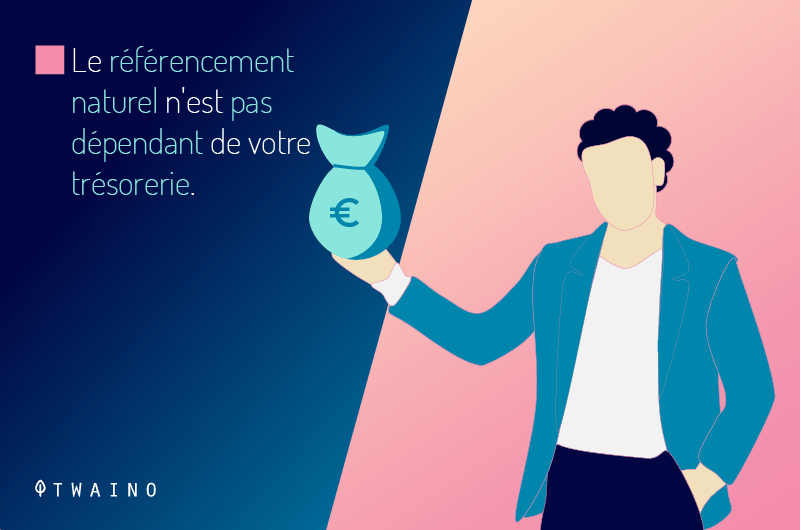
On the other hand, if you rely on advertising for all your traffic acquisition, the slightest drop in activity (and therefore revenue) prevents you from investing in a new campaign.
Moreover, a constant and predictable flow of visits allows you to have reliable and sufficient data to analyze your trafficwith tools like Google Analytics.
Thus, you can easily observe your conversion rate (i.e. the proportion of visitors who finalize a purchase), the amount of the average basket and, more generally, the behavior of users.
Finally, you have probably heard about the multiple google’s algorithm changes.
And maybe you think that, in this case, you will waste your time setting up your SEO when the algorithm may change in a few weeks.
In fact, the algorithm changes are mainly intended to avoid circumvention of the rules of Google
Indeed, it is possible to get traffic by not respecting Google’s recommendations.
However, I do not advise you to do so at all because the search engine robot will sooner or later realize it and penalize you!
At best, Google will modify its algorithm so that deception is no longer possible and you will have, in any case, lost time.
Whereas if you respect the rules, you do not take no riskeven when the algorithm changes
This is what makes SEO one of the safest traffic acquisition levers.
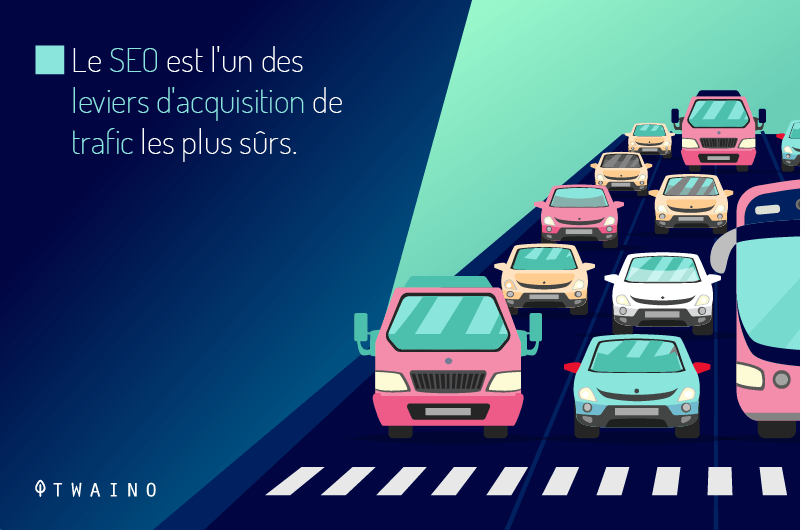
Relevance and popularity are at the heart of SEO
In case you’ve been stuck on old SEO models, I can tell you this: don’t expect to to keep your site in good position by stuffing it with keywords without consistency.
Also, the time when we wrote keywords in white on a white background, so that search engines see (wrongly) the pages as super-relevant, is also over (and so much the better!).
Today, when Google decides to keep a page at the top of its results, it is because it considers that it deserves it.
And for a page to deserve to be on top, it must provide an answer to the usera solution to his problem.
Because the 5.5 billion queries entered on Google every day all have one thing in common: they originate from a question of the Internet user, a need that he wants to satisfy.
So you can imagine that it is certainly not by filling a page with keywords end to end that you have the slightest chance of answering the request of your future customer!
On the contrary, Google permanently favors pages that are REALLY useful. And in this way, it makes you enter a virtuous circle.
Let me explain.
When a user asks a question to Google and sees a link to your site on the first page of results, he is convinced, even before clicking on it
- That your page will give him the answer to his question
- That you did not pay to be in first place and that, therefore, Google trusts you without any compensation. And if Google trusts you, the Internet user can trust you too.
On the other hand, if you disappoint this future customer as soon as he arrives on your e-commerce (by not bringing him the solution to his problem, for example), he will turn back immediately.
And it will give Google a clear signal: your page is not interesting. As a result, Google will drop it in its search results.
Thus, increasing the relevance of your site has a double effect on your SEO.
On the one hand, it creates, mathematically, traffic to your online store.
On the other hand, it improves your popularity: Google will know that your pages are worthy of interest.
And it happens that popularity is one of the criteria taken into account in the positioning of sites
You understood it: focusing on the relevance and popularity of your e-commerce, it’s all good for you!
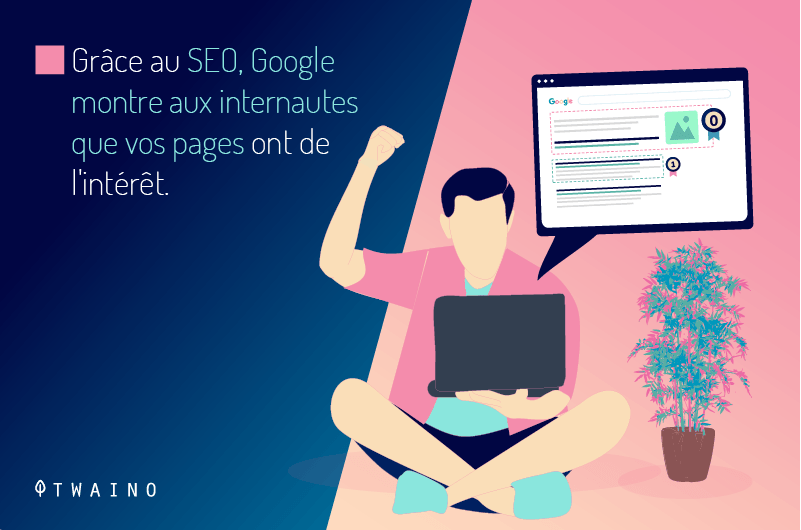
The user experience as a sales lever
As we have just seen, your SEO must put the customer at the heart of your concerns. You must absolutely provide him with the answer to his problem.
And to do this, relevance and popularity are essential, but don’t forget what we call the user experience.
This is everything that surrounds the navigation of the user on your pages: the fluidity of the site, the clarity of content, the attractiveness of visuals ..
In fact, the user experience (or UX, from the English User eXperience) appeals to the sensations and feelings of the visitor
You may think that this is of little importance on your e-commerce and that as long as your product sheets are well informed, it is enough to to encourage the purchase?
However, the user experience also plays an essential role.
On the one hand, it puts the Internet user in the best (or worst!) position to order
Indeed, by surfing on a nice looking site, which loads quickly, you are more relaxed and more more inclined to place an order.

On the other hand, the conversion rate and the bounce rate (the proportion of visitors who leave a site having seen only one page) are positioning criteria on Google.
In fact, the longer a visitor stays on your site, the more he fulfills your objectives by placing an order, the more he surfs among your pages and the more Google knows that your contents are interesting.
You understand why it is so important for your SEO that customers feel good on your site!
The backlinks essential for SEO… but not only !
Relevance and popularity are, as we have seen, essential for SEO
And beyond the keywords and the structure of your content, there is another pillar in SEO, which you can’t get rid of.
These are the backlinks. These are links from external sites, which point to your pages. This is called netlinking.
They indicate to Google that your site is popular and that it has a certain authority, the proof, others talk about it!
In reality, it works like for a physical business: word-of-mouth is an undeniable undeniable source of traffic.
And if people are talking about you, you probably deserve to be trusted.
On the Internet, there are several ways to get backlinksguest articles are one of them.
It is about proposing to a partner, if possible in the same field as you or in a close field, to publish on his site a content that you wrote in your name.
Most of the time, guest articles are blog posts, which include a link to your pages.
Of course, it’s not about selling your products out of the blue (that would be completely counter-productive), but to bring a real added value for the readers.
And if these readers are part of your target (so if you have carefully chosen your partner), the guest article will provide your e-commerce with qualified traffic, in addition to a certain authority in the eyes of Google.
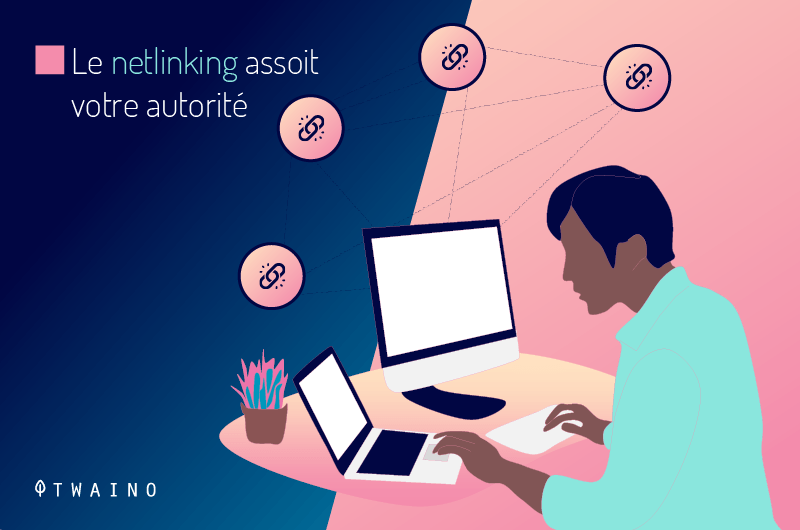
And that’s not all… Because to find sites ready to provide you with backlinks you will meet people, connect, expand your network.
In the same way, you can also welcome guest articles from partners with whom you will exchange and share ideasin related fields.
You have probably understood that, in addition to the direct interest in bringing traffic and notoriety, the netlinking is also very valuable to open the professional horizons of your e-commerce.
Who knows, the author of a guest article today may be your collaborator tomorrow!
I hope to have convinced you that it is not advisable to neglect natural referencing when you are an e-merchant!
When you know that more than 93% of online experiences start on Googlewhy do without this powerful help?
Of course, this does not exclude using other levers in parallel (advertising, social networks…), because they all have their advantages and disadvantages, and can be used simultaneously.
However, for me, SEO remains the first choice, for all the reasons I just explained.

